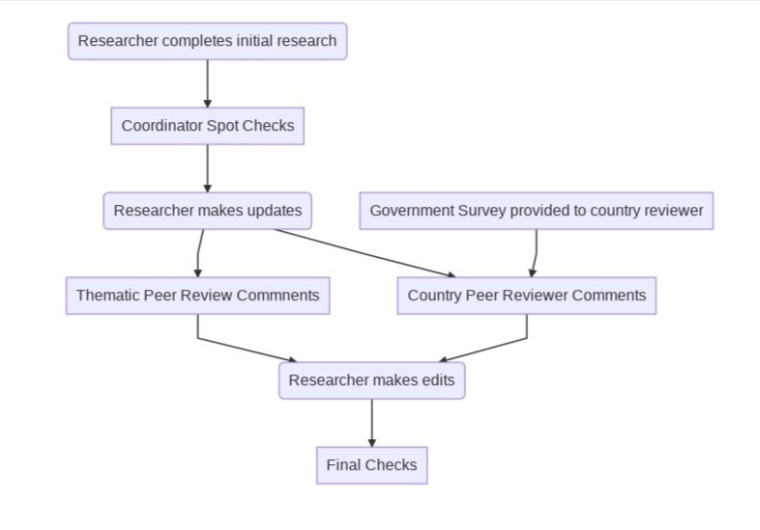General Guidance¶
The handbook is designed to be a one-stop resource on the GDB assessment process, including detailed information on methodology, general guidance to researchers, sources to be used, as well as detailed question-by-question guidance for researchers. Here you'll find both general guidance, about the research parameters and process overall, as well as guidance specific to each indicator
Time Period for the Study¶
Each edition of the Barometer will focus on a particular defined time period. Researchers are asked to focus on evidence and sources available within that period of time, and should provide answers based on their assessment of the state of data within the country within that defined period.
- The 2021 pilot edition of the GDB will cover activities, observations, and evidence that pertains to the state of data between May 1st, 2019 and May 1st, 2021.
Therefore, for questions regarding policies, strategies, capacity-building interventions, dataset availability, or uses of data, identified examples should have occurred OR remained current during the 2-year period, and wherever possible, researchers should cite sources from the defined period that indicate this is the case. For example:
- A country that had a 'Data Strategy 2015–2019', but that does not have a more recent strategy document, would not be assessed as having a data strategy in this study period.
- A country that has a 'Data Strategy 2018–2022', published in 2018, but with evidence that it continues to be active and implemented, would be assessed as having a data strategy in this study period.
- Updates to a country's data portal on June 1st 2021 would not be counted in the assessment for this study period.
- To include a use of data first reported in an article in 2016 in the assessment, the researcher must provide a citation or source to show that this use remains active or has meaningfully developed in recent years.
- If COVID-19 has affected data availability at any point during the study period, this would count as a case of COVID-19 affecting data availability, even if changes have been reversed by May 1st 2021.
The Research Process¶

- For each country in the Barometer's expert survey, a country-level researcher performs desk research and consults with key individuals to respond to the survey questions and provide a justification for each answer. Many questions have suggested starting points, providing researchers with sources to work from.
- A research coordinator will carry out spot-checks on responses as they are completed and will provide feedback on areas to improve.
- Once the initial survey is complete, researchers will act as peer reviewers, checking the answers provided by colleagues, in a crossed peer review mechanism, offering comments or questions where required, or requesting additional detail in the justifications. Reviewers will also have access to evidence provided by the government in response to a parallel government survey and will use that to inform their comments.
- After review, the survey may be returned to the researcher to check each comment and make changes where required or to add additional justification for assessments.
- Updated surveys are returned for a check by the coordinator or reviewer, and when they are satisfied with the quality of the assessments, the core GDB team will organize a follow up review of the assessments by thematic experts. Thematic experts may flag certain responses for additional research, correction, or clarification, and provide notes for the researcher to respond to.
This iterative process will lead to a final set of well-researched and well-sourced indicators.